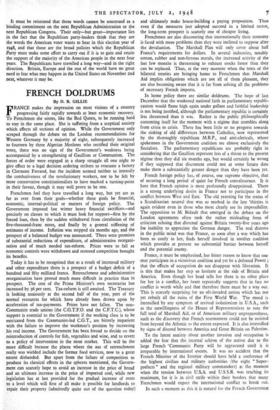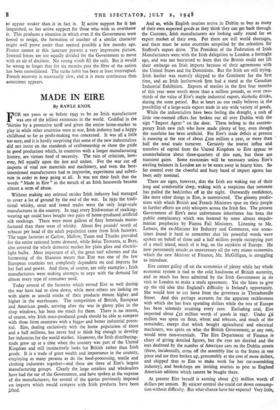FRENCH DOLDRUMS
By I). R. GILLIE
Frenchmen feel they have travelled a long way, but yet are as far as ever from their goals—whether these goals be financial, economic, internal-political or matters of foreign policy. The Government imposed last winter heavy financial sacrifices—and precisely on classes to which it must look for, support—first by the forced loan, then by the sudden withdrawal from circulation of the five-thousand-franc notes, and finally by a general stiffening of estimates of income. Inflation was stopped six months ago, and the prospect of a balanced budget was announced. There were promises of substantial reductions of expenditure, of administrative reorgani- sation and of much needed tax-reform. Prices were to fall as economic controls were withdrawn and restored competition brought its benefits.
Today it has to be recognised that as a result of increased military and other expenditure there is a prospect of a budget deficit of a hundred and fifty milliard francs. Retrenchment and administrative reorganisation have proved much more difficult in practice than in prospect. The cost of the Prime Minister's own secretariat has increased by 36 per cent. Tax-reform is still awaited. The Treasury is looking anxiously at the second half of the year, part of the normal resources for which have already been drawn upon by acceleration of tax-payments. Prices have not fallen. The non- Communist trade unions (the C.G.T.F.O. and the C.F.T.C.), whose support is essential to the Government if the working class is to be extricated from the Communist-led C.G.T., are bitterly impatient with the failure to improve the workman's position by increasing his real income. The Government has been forced to decide on the reintroduction of controls for fish, vegetables and wine, and to revert to a policy of intervention in the meat market. This will be the more difficult because the places where the axe of retrenchment really was wielded include the former food services, now to a great extent disbanded. But apart from the failure of competition to produce its classical effects in the spheres mentioned, the Govern- ment can scarcely hope to avoid an increase in the price of bread and an ultimate increase in the price of imported coal, • while new legislation has at last provided for the gradual increase of rents to a level which will first of all make it possible for landlords to repair their property (admittedly quite out of the question today) and ultimately make house-building a paying proposition. Thus even if the measures just adopted succeed in a limited sector, the long-term prospect is scarcely one of cheaper living.
Frenchmen are also discovering that internationally their economy is faced with more problems than they were inclined to suppose after the devaluation. The Marshall Plan will only cover about half. France's requirements for dollars. In several industries, notably cotton, rubber and non-ferrous metals, the increased activity of the last few months is threatening to exhaust stocks faster than they can be replaced. -Thus, at the very moment when the texts of the bilateral treaties are bringing home to Frenchmen that Marshall Aid implies obligations which are not all of them pleasant, they are also becoming aware that it is far from solving all the problems of necessary French imports.
In home policy there are similar doldrums. The hope of last; December that the weakened national faith in parliamentary republi-, canism would flame high again under gallant and faithful leadership is not being justified, although the parliamentary republic is certainly, less threatened than it was. Rather is the public philosophically contenting itself for the moment with a regime that stumbles along from crisis to crisis. There has been little or no progress towards the sinking of old differences between Catholics, now represented by the thoroughly republican M.R.P., and anti-clericals, whose spokesmen in the Government coalition are almost exclusively the Socialists. The parliamentary republicans are probably right in considering that the Gaullists represent legs of a threat to the present regime than they did six months ago, but would certainly be wrong if they supposed that discontent could not at some future date make them a substantially greater danger than they have been yet.
French foreign policy has, of course, one supreme objective, that of securing a long period of quiet for French convalescence. It is here that French opinion is most profoundly disappointed. There is a strong underlying desire in France not to participate in the conflict between West and East. The old yearning for the status of a Scandinavian neutral that was so marked in the late 'thirties is again evident even in those who most clearly see its impossibility. The opposition to M. Bidault that emerged in the debate on the London agreements often took the rather misleading form of criticism echoing that directed against Britain twenty-five years ago for inability to appreciate- the German danger. The real distress in the public mind was that France, so soon after a war which has been so costly to her, finds herself involved in another coalition which provides at present no substantial barrier between herself and the potential enemy.
France, it must be emphasised, has bitter reason to know that one may participate in a victorious coalition and yet be a defeated Power ; that the effects of occupation do not disappear with liberation. It is this that makes her step so hesitant at the side of Britain and America. Even though her head tells her there is no other place for her in a conflict, her heart repeatedly suggests that in fact no conflict is worth while and that therefore there must be a way out. This is scarcely surprising for an oft-invaded nation which has not yet rebuilt all the ruins of the First World War. The mood is intensified by any symptom of revived isolationism in U.S.A., such as the unwillingness of the House of Representatives to vote the full total of Marshall Aid, or of American military unpreparedness, such as the discovery that French rearmament could not be assisted from beyond the Atlantic to the extent expected. It is also intensified by signs of discord between America and Great Britain on Palestine.
To the latent anxiety about another invasion and occupation is added the fear that the internal schism of the nation due to the large French 'Communist Party will be aggravated until it is irreparable by international events. It was no accident that the French Minister of the Interior should have held a conference of the highest civilian and military authorities (the eight " Super- prefects " and the regional military commanders) at the moment when the tension between U.S.A. and U.S.S.R. was reaching its maximum, for it is in civil strife within their borders that many Frenchmen would expect the international conflict to break out.
In such a moment as this it is natural for the French Goverrunew to appear weaker than it in fact is. If active support for it has languished, so has active support for those who wish to overthrow it. This produces a situation in which even if the Government were forced to resign, the formation of another of a similar character might well prove easier than seemed possible a few months ago. France cannot at this juncture present a very impressive picture. Internal forces are too equally divided for the Government to move with an air of decision. No strong winds fill the sails. But it would be wrong to forget that for six months past the fibre of the nation has been consolidated. The strike habit has been at least interrupted. French recovery is necessarily slow, and it is more continuous than sometimes appears.







































 Previous page
Previous page